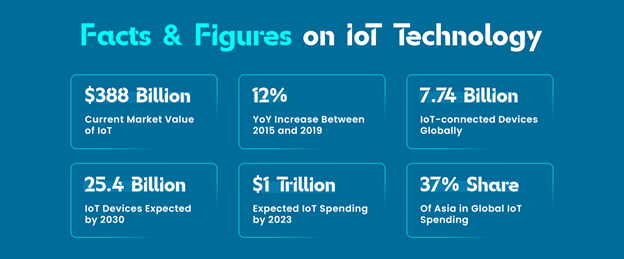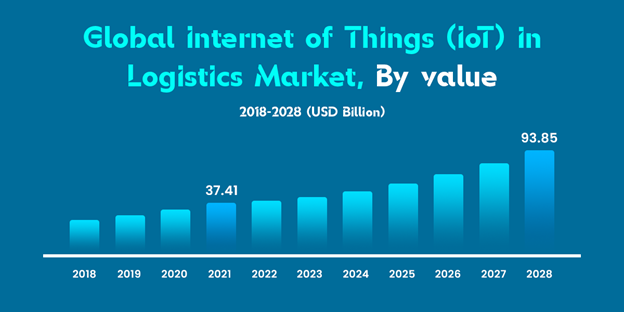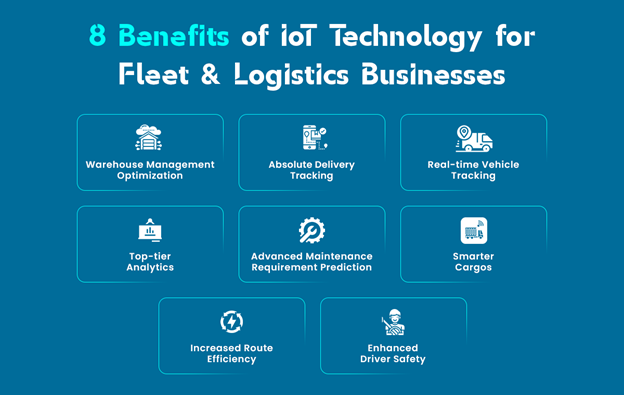
The fleet and logistics industry is one of the most vital parts of the present-day economy. The functioning of numerous other industries, most prominently eCommerce, manufacturing, and retail rely heavily on how efficiently the logistics sector is working.
Since the start of the COVID pandemic, the pressure on logistics businesses to become efficient has grown to a tremendous level. To keep up with demand, more and more businesses in this industry are going digital and are implementing digital technologies in their operations.
A commonly used technology by fleet and transportation businesses is the Internet of Things (IoT). This technology has not only enabled fleet businesses to automate their processes but has also empowered them to enhance their customer’s experiences and satisfaction with their digitalised services.
Let’s take a look at what IoT technology is and how it is being utilised to improve efficiency in the logistics sector.
What Is the Internet of Things?

IoT: a highly advanced technology better known for its intelligent ability to combine hardware with software and take processes to the next level of digital efficiency.
In simple words, IoT is a network of objects and devices that are interconnected with sensors and is empowered with digital technologies like software. This web of technologies is useful in exchanging data over the connection and even processing it.
Owing to the tremendous potential of this technology, IoT has become a household name for the present generation. Today, IoT-based solutions are used in numerous aspects of our everyday life, from smart security to intelligent home sensors and businesses.
Businesses from industries like healthcare, hospitality, retail, and agriculture have been quick to recognise the potential of IoT technology and have already implemented it in their operations. However, it is safe to say that no other industry has benefitted from IoT technology more than logistics and transportation.
The upcoming section will provide detailed information on the scope of IoT technology in the fleet and logistics industry.
IoT In the Fleet & Logistics Industry
The logistics industry has faced a considerable revolution in recent years and has become smarter and more efficient than ever before. Thanks to the mass digitalisation of the industry from the recent pandemic, businesses in this sector are learning to utilise technology to their advantage and are gaining process efficiency.
The Internet of Things has an undeniably critical role in this aspect. This technology has enabled businesses in the logistics industry to cut down on human resource requirements, increase profitability, deliver a high-end customer experience, and, most importantly, optimise processes to achieve overall operational efficiency. Take a look at the below-given chart to understand the growing role of IoT technology in the logistics sector.

Owing to all these benefits and numerous others, the market size of IoT technology in the logistics sector has crossed USD 34,504.8 million in 2019. This only goes to prove that by implementing Internet of Things-based solutions, logistics businesses can easily increase their profitability and grow in the competitive market.
However, what exactly is the use of IoT technology in the logistics sector, and how does this technology contribute towards the betterment of fleet and logistic businesses? Let’s find the answer to this question in the upcoming section.
8 Ways in Which Fleet & Logistics Businesses Benefit from IoT
Warehouse Management Optimisation
Managing the warehouse and inventory is one of the core operations of every fleet and logistics business. However, this is easier said than done, as businesses that operate on a large scale often find it challenging to keep optimal track of the inventory. This often results in logistics errors, which can result in delayed deliveries and even loss of tracking information for an item.
As a result, it is essential for all logistics businesses to integrate processes that add to its warehousing efficiency and optimise warehouse management. One of the best ways to achieve this objective is to integrate IoT-based warehouse management solutions.
The present-day IoT sensors are highly efficient in automating inventory management and warehousing and are a one-stop solution for all logistics requirements. IoT is capable of automating one of the most cumbersome warehousing processes, which is updating logistic data. The technology uses smart sensors for this purpose and is often integrated with other high-end technologies that facilitate automated data uploading and updating.
Absolute Delivery Tracking
We mentioned before that the fleet and logistics industry plays a vital role in the optimal functioning of numerous other industries. One of the best examples of this role is evident in the eCommerce sector, where e-retailers collaborate with logistics and transportation businesses to sell their goods online and get them delivered to the customer’s doorstep.
One of the most essential aspects of online retail is to enable customers to track their orders in real-time. However, businesses have to make extra efforts to offer this feature. Naturally, this comes at the expense of more human resources, cost, and infrastructure requirements. However, a business can easily avoid this altogether by investing in IoT technology.
Being a smart technology, IoT enables automated and seamless tracking of packages in real-time. Moreover, since the technology works on the fundamental of interconnected devices that share information, it facilitates effortless and error-free order tracking.
This aspect of IoT is not only useful for customers but also for logistics businesses. This is because businesses can easily track the package’s location in case it is misplaced and avoid losses.
Real-time Vehicle Tracking
Just like order tracking is important for customers, vehicle tracking is crucial for logistics businesses throughout the delivery process. However, it is highly challenging for businesses operating with manual processes to track the precise geolocation of the vehicles in real-time.
One of the best solutions in this aspect is to use IoT-based smart GPS solutions and integrate them with transportation vehicles. These devices not only enable businesses to track the real-time location of the vehicles but are also useful in monitoring other factors like speed, estimated reach time, etc.
Advanced IoT solutions for vehicle tracking also enable businesses to track whether or not the transportation vehicles are following the right route or not.
Top-tier Analytics
Analytics form a vital part of every business. Today, most businesses utilise analytical data from the past as a foundation for strategic planning. Logistics and transportation businesses are no exception in this matter. The businesses in this industry utilise analytics to reflect upon their previous performance, processes, and operations and use the information to curate future strategies. However, it is often challenging for businesses to gain access to this analytical information without using digital technologies.
IoT technology is highly useful for this purpose and is highly capable of automatically recording, storing, processing, and presenting analytical data. To elaborate, businesses can integrate IoT technology with other digital technologies like cloud computing or blockchain to efficiently store analytical data and artificial intelligence to convert this raw data into useful analytics.
What’s more? All of this process is automated and requires no human effort at all. This makes implementing IoT an optimal solution for logistics businesses looking to gain access to detailed and precise analytics.
Advanced Maintenance Requirement Prediction
Along with optimal tracking, every fleet and transportation business also aims to ensure the optimal quality of its vehicles. This factor is essential to ensure that there are no delays in order delivery or transportation process due to faulty vehicles or unexpected breakdowns.
However, for transportation businesses operating on a large scale, this objective is often challenging to achieve. This is because these businesses have a large number of transportation vehicles to manage. In this case, examining every vehicle routinely can be impractical for businesses. This is where IoT comes into play.
IoT is highly capable of automating vehicle examination and performance and can be easily used to predict a vehicle’s maintenance requirements. These devices then create an alert in case of expected faults and potential vehicle breakdowns.
This feature of IoT-based fleet solutions makes it easy for businesses to determine which vehicle to use for transportation and which one needs servicing and repair. Using this feature, businesses can, by large, avoid delayed deliveries and prevent unforeseen transportation delays.
Smarter Cargos
At present, people use fleet services to transport all types of goods and products. In many cases, certain goods require special handling, especially those which are fragile or perishable. However, owing to the large scale of operations, fleet businesses often fail to fulfill this requirement, which results in damage to goods.
In this case, it is in the best interest of the fleet and transportation businesses to integrate IoT technology and make their cargo smart. To explain, IoT makes it possible for transportation businesses to differentiate regular goods from the ones requiring special care and take measures that prevent damage to goods.
IoT-powered cargos are specially designed to track and record situations that can potentially damage the goods. One of the best examples in this aspect is IoT sensors recording temperature changes or shocks, which are two common culprits for damage and breakage in transportation. These sensors can then generate alerts for businesses to take optimal measures and avoid losses.
Increased Route Efficiency
One of the most vital parts of transportation efficiency is optimising the route of transportation. This can enable businesses to reduce transit time and deliver goods within the expected time frame. However, it is also commonly known that transportation is a delay-prone process, regardless of how well-planned it is.
Here, using IoT technology is a billion-dollar idea for businesses to optimise the transportation route. Earlier, we had mentioned the role of IoT in tracking vehicles and communicating optimal navigation. This feature of IoT is highly useful in optimising routes of transportation for fleet businesses.
To explain, IoT technology can efficiently communicate the most optimal transportation route with the vehicle driver in real time and provide detailed navigation. This ensures that the driver follows the most optimal roadmap for the efficient transportation of goods from one place to another. The efficiency of a road map is based on factors like choosing the shortest route, avoiding routes with high traffic, avoiding blocked routes, etc.
Overall, utilising IoT-based technology to communicate the route and vehicle transportation can be a revolutionary idea for transportation businesses to optimise transit time as well as save on fuel costs.
Enhanced Driver Safety
While it is important for transportation businesses to follow the right travel route for efficient transportation, it cannot be denied that the safety of the driver is equally important, if not more. However, it is often challenging for businesses to ensure the vehicle driver’s safety. This results in severe road accidents, which can be fatal at times.
These accidents can be largely avoided by using IoT technology for the matter. IoT makes it easy for transportation businesses to ensure that the driver transporting the goods is safe and secure. To explain, IoT-based sensors are useful in recording factors like driving speed, number of harsh breaks, rough driving, etc. This information is useful in training drivers to drive optimally for their as well as goods’ safety.
Moreover, IoT-based solutions can also be used to integrate devices like smoke detectors, fire alarms, CCTV, etc., with the vehicle’s machinery to avoid and manage hazards efficiently. This aspect of IoT technology can be lifesaving for drivers and highly useful for businesses.
These were the top benefits of integrating IoT technology with your fleet and transportation business. However, you must be wondering how can a fleet business integrate IoT with its operations, right? The next section will provide complete information on this subject, so read carefully.

How to Implement IoT in Your Fleet & Transportation Business?
If you are a fleet business that is planning to go digital, let us tell you that this is the best time to embrace digitalisation and take your business online. We are sure by now that you are aware of why it is in your best interest to utilise high-end technologies like IoT to optimise your transportation business.
However, to integrate IoT technology into its operations, a business also needs to utilise human-understandable technology. Mobile applications are the best option in this matter and are popularly integrated with IoT. The duo of IoT + mobile applications is popularly used by numerous businesses from across the globe. Industries that have adopted IoT technology use mobile apps to make the best use of the technology.
Mobile applications are highly user-friendly and technologically advanced, making them an ideal digital technology for IoT integration. Of course, this will come with an additional cost and time investment. A high-end IoT application can take anywhere from $50,000-$80,000, with an average development timeline of 500-800 hours.
However, let us tell you that these are just estimates. The final cost and development timeline of your application will depend upon numerous factors such as IoT hardware, network, infrastructure requirement, features required, etc. Therefore, we recommend consulting with an experienced development agency and getting their input on the project. You can also control this cost by creating a simple application, the cost of which can be anywhere around $30,000-$40,000, or even less.
We hope that by now, you are clear on why it is a good idea to integrate mobile applications with your IoT solutions.
Summing It Up
The Internet of Things is a revolutionary technology with high potential for logistics and transportation businesses. IoT technology has numerous implementations in this particular industry and has the potential to overturn the paradigm of the fleet and logistics sector for good.
Process automation, increased safety, and enhanced efficiency are a few of the many ways in which transportation businesses can benefit by implementing IoT technology. Moreover, a business can use technology to reduce operational costs and increase profitability.
All these factors make IoT an excellent technology for businesses operating in the logistics and transportation sector. By realising this potential of IoT on time and implementing the technology, you are certain to get maximum benefits from the technology. You can take your logistics and transportation business to the next level of success.

Excel in your logistics ambitions with IoSCM. Click here to find out how!
